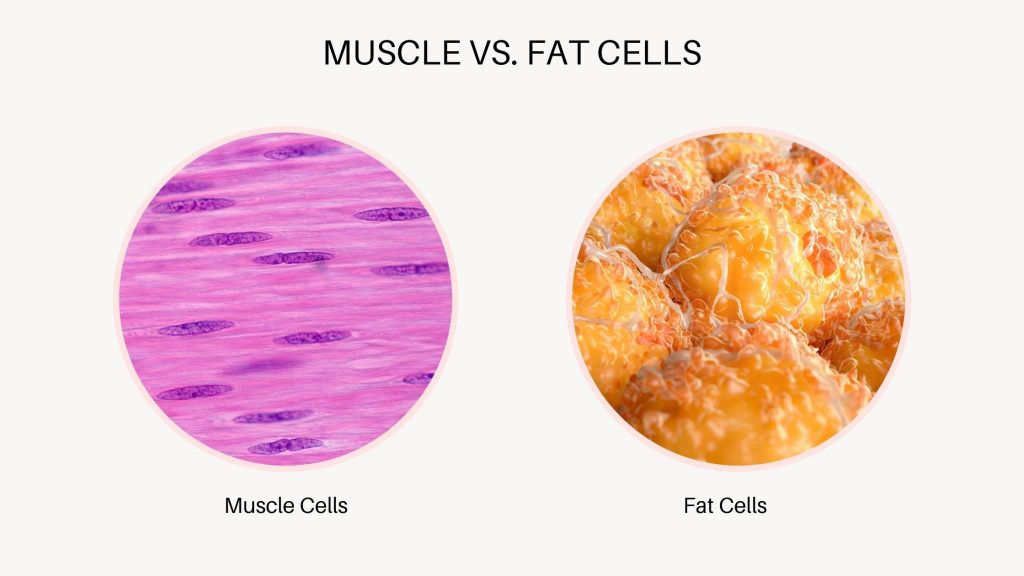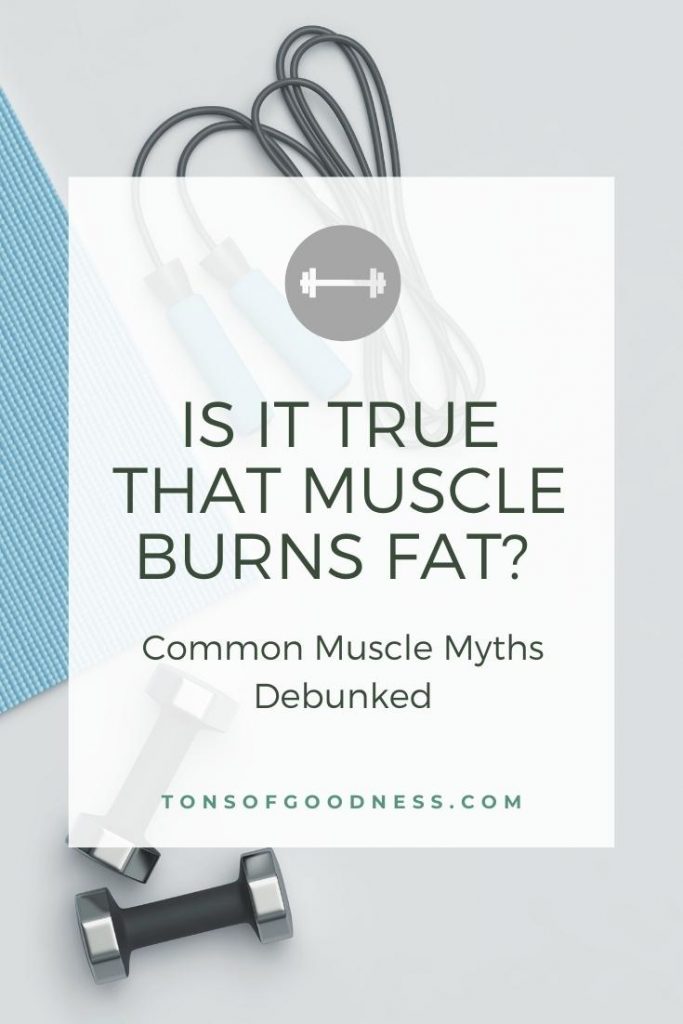

Disclosure: Some of the links in this article are affiliate links, which means that if you purchase through those links I will receive a small commission. For example, as Amazon Associate, I earn from qualifying purchases. If you decide to use these links, thank you!
There is a lot of misinformation out there about exercise and fitness. People regularly take advice from outside resources, whether from friends and family or from people trying to sell us workout programs. And some of these myths can affect the way you exercise.
Here’s the deal…
I just started the new Beachbody program called Muscle Burns Fat (#mbf) and I am loving the workouts. However, when I first heard the name of this program, Muscle Burns Fat, I was skeptical that this was just a gimmicky workout program. So I wanted to dive into the research and find out if it’s true that muscle burns fat.
Before we chat about whether muscle burns fat, I want to debunk a couple of myths about muscle that I hear pretty often.

The first myth is that muscle turns into fat, and vice versa.
This myth is completely false because muscle and fat are two entirely different tissues and they can’t transform into each other.
Think about it…
A muscle is made up of thousands of elastic fibers bundled tightly together (source). Each bundle is wrapped in a thin transparent membrane called a perimysium. Muscle cells are made up of protein, amino acids, and water.
On the other hand…
Fat cells are made up of connective tissue and lipid droplets of fat (source). Most of our body fat is stored in fat cells called adipocytes, but can also be stored as droplets within skeletal muscle cells. In addition, some triglycerides flow in your bloodstream.
The Truth: Muscle cannot turn into fat, and vice versa.

I believed that I had to lift heavy weights to build strength until I recently completed the Barre Blend program from Beachbody. With this workout you are using 1 to 3-pound weights (and body weight) to perform ballet barre and pilates movements.
When I first heard about this program I was very skeptical. Me, lift 1 to 3-pound weights?! Well, I dusted off my 3-pound weights to give it a try.
Here’s what happened…
Each exercise worked my muscles in a way that I had not experienced before. My endurance for lifting lighter weights at high reps increased and my form improved. And when I returned to a program that requires heavier weights I was able to lift more than before!
Why?
According to Kayla Balserak, NASM Certified Personal Trainer and Founder of The Fit Writer, lifting light versus heavy weights is a matter of muscular endurance versus strength, and both are amazing for overall strength and health!
Kayla explained that working with lighter weight and more reps will help strengthen and challenge our slow-twitch muscle fibers. These are the muscle fibers that don’t experience fatigue easily or quickly.
On the contrary, working with heavier weight and fewer reps will strengthen and challenge your fast-twitch muscle fibers. These fibers fatigue more quickly, but they also provide more force than a slow-twitch fiber.
“The best way to think of the difference between these muscle fibers is a marathon runner versus a sprinter,” Balserak explains.
Lighter weights (even bodyweight) and higher repetitions also let your muscles recover from periods of heavier lifting and gives you the chance to gain more muscle fibers while building endurance (source).
The Truth: Like Kayla said, both types of weights are great for strength and overall health!


The simple answer is that one pound of fat and one pound of muscle weigh exactly the same – one pound.
The difference is the amount of space they each take up. Muscle is made up of fibers that are tightly woven together. On the other hand, fat is made of different sized droplets. The fat cells stick together but have space in between. So, a pound of muscle takes up less space than a pound of fat.
According to Michele Olson, Ph.D., Senior Clinical Professor of Sport Science and Physical Education, it takes approximately four pounds of muscle to fill the space of one pound of fat.
So, if you participate in a workout program and gain muscle mass, you may see the number on your scale go up. But, this is a good thing because you are getting stronger! (Here are more reasons why you should ditch the scale.)
The Truth: One pound of fat and one pound of muscle weight the same.

This is the question that originally led me to write this post. What I found is that the answer is…kind of.
Let me explain.
Your body naturally burns more calories each day to maintain a pound of muscle than it does to maintain a pound of fat. This means that gaining muscle can help to increase your metabolism and has the potential to help you “burn” calories and fat.
However, the problem with saying that muscle burns fat is that it’s highly exaggerated.
This is because one pound of muscle burns approximately 5-6 calories per day at rest. In comparison, a pound of fat burns about two calories per day.
This isn’t really a significant amount of calories in the big picture of your day.
However, research shows that starting as early as age 30, the body begins to slowly lose muscle mass, with women losing up to 15 percent of their total-body muscle per decade by age 50. Apart from declines in strength, that declining muscle mass comes with a declining metabolism. Therefore. strength training is especially important to maintain muscle mass and your metabolism.
And really, adding muscle as a way to burn more calories is missing the point. Yes, strength training can help you burn calories, but it can also:
These are just a few of the benefits of strength training! To learn more check out this article:
Strength Training: Be MORE and Change Your Life
I am a huge fan of strength training and have completed almost all of the Beachbody workout programs. Check out these reviews to find out which one is best for you! And, by the way, Muscle Burns Fat is definitely not a gimmicky program. I am finishing up week three and am impressed by the combinations of movements and creativity of the program.
10 ROUNDS by Beachbody on Demand: Review and Tracking Sheets
21 Day Fix Real Time Review and Tracking Sheets
Morning Meltdown 100 Review & Tracking Sheets
New! 21 Day Fix EXTREME Real Time Printable Tracking Sheets, Instant Download




